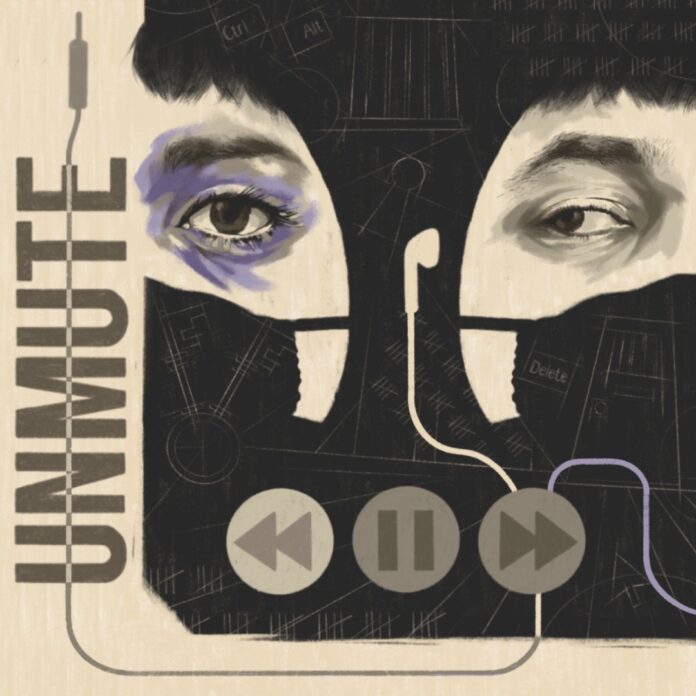Since being confined within four walls, theatregoers have had fewer opportunities to go out and watch a great show. Lucky for us, those who write, produce, and perform for the stage are, at their very core, creative beings who need an outlet. Thanks to their creativity, we can now enjoy theatre on platforms like Zoom.
On the United Nations’ International Day for the Elimination of Violence against Women (Nov. 25), I had the pleasure to see one such show, Unmute: The Impact of a Pandemic on Gender-Based Violence. Organized and produced by Canadian touring Theatre company, Theatre on The Beat, an organization founded by two UW grads, this piece brought to light a very important issue our society faces, and one amplified by the pandemic—domestic and gender-based violence.
This show was perfectly designed to be performed on Zoom, with all its scenes either showing characters video chatting with each other or doing some other work on their laptops, making a laptop camera the ideal medium to convey the story—people’s creativity never disappoints.
Divided into two parts, the show was structured in an interesting manner completely new to me. During the first half of the show, as a standard product, the cast performed the complete play for the audience. The second half, however, got the audience involved. The cast performed parts of the scenes we had already seen, but this time the audience were encouraged to say “Stop” anytime they felt a character should have behaved differently. The person stopping a scene was then given the opportunity to take over that role and show the rest of the audience how they believed the scene should have gone.
Each of these scenes was followed by a brief discussion amongst the audience as to what was done differently and why that made a difference. The actors, in character, joined in these conversations as well. While doing this exercise, there were two characters we could not comment on: Dawn, the victim, since saying that she should have done anything differently would have essentially amounted to victim-blaming; and Scott, the abuser, since it was unrealistic that he would do anything differently. Including the audience in the narrative was immensely powerful because the roles examined were roles any of us could be playing.
Written by Cedric Martin, Lindsey Middleton, and UW grad Kimberlee Walker, this play had a simplistic script grounded in reality—one of its most notable features. When presenting a real-world problem like domestic violence, it is very important to keep things simple and realistic so that the audience can reflect on the issue and put themselves in the bystander’s shoes. The principal purpose of this piece was not just to inform the audience of the issue, but also to help them better prepare themselves to respond to any gender-based violence they may be witness to.
The script was well-suited to the structure of the show, as it showed regular mistakes that people might make when dealing with domestic violence – keeping out of it because “it’s none of our business,” citing a behaviour pattern many people exhibit, especially when justifying not being able to pick up on canned behaviour patterns of the victim. Such mistakes were believable for the audience, but they also provided us with the chance to see what could have been done differently.
The show was brought to life by a phenomenal cast. Duncan Gibson-Lockhart played the part of Scott, the abusive husband. He brilliantly embodied the classic gaslighting abuser, who presents two vastly different personalities; one for the public and one for home. Everything from his speech, down to his facial expressions and body language sold the role. He was able to incite anger in the audience, so much so that I momentarily forgot he was simply playing a character.
Frances Loiselle appeared in two roles – as Dawn, Scott’s wife and victim, and Hailey, their daughter. Playing multiple roles in a play is a tough job, but Loiselle did them both justice. As the victim, her role was far more emotional than any other character. She did a fantastic job portraying the timid, scared personality this character needed. As the daughter, she had to act scared as well, but this was a different kind of scared and she showcased the contrast brilliantly.
Also playing two parts was Lindsey Middleton, who played Barb, Dawn’s friend, and Addi, Barb’s daughter and Hailey’s girlfriend. Both of her characters were vastly dissimilar, yet she was able to give amazing performances in both roles. Spectacular performances were also given by Calvin Petersen and Yusuf Zine, who played the parts of Jay, Barb’s husband and Scott’s friend, and Ryan, Scott’s friend and Dawn’s boss, respectively.
From seeing what theatre on Zoom looks like, to getting a chance to be involved in the play as a member of the audience, this experience was certainly a memorable one. Of course, it was also an interesting and informative show and I would certainly recommend anyone who can to check it out.






























